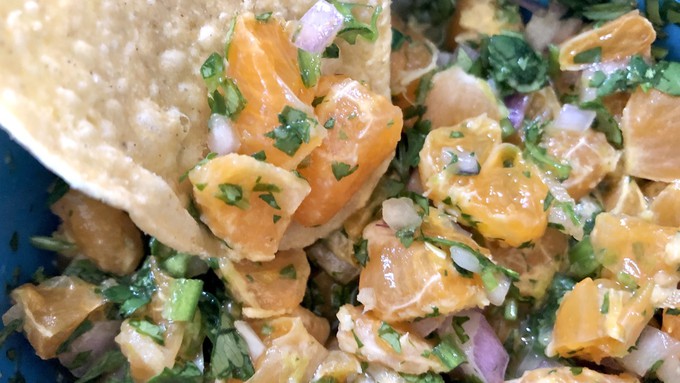
Recipe: Seasonal condiment pairs well with chips or seafood

Let the mandarin, jalapeno, red onion and cilantro flavors meld a bit, then dig in to this fresh winter salsa. Kathy Morrison
As much as I love the flavors of Thanksgiving, by the end of the holiday weekend I'm desperate for different ones -- but not Christmas flavors, not yet.
Fortunately, I have plenty of mandarins in that 10-pound bag I bought from one of our foothill growers. Mandarins aren't great for baking but they do play well in salads and other fresh creations.
Salsa, I decided, was about as far as I could get from mashed potatoes, turkey gravy and sage-scented stuffing. It relies on fresh ingredients at any time of year, including plenty of fresh cilantro.
I used the smallest of the mandarins that were in my bag, and 6 of those produced about 1 cup of chopped pieces, but adjust the number depending on the size fruit you have.
Try this salsa with tortilla chips or over some grilled seafood or chicken. Spice it up some more, with hotter peppers or some red-pepper flakes, if that's to your taste, too.
Mandarin and lime winter salsa
Makes about 1-1/2 cups
Ingredients:
4 to 6 mandarins (Satsumas or clementines), about 3/4 pound before peeling
1 jalapeño, de-seeded and minced (use 2, or another type of hot pepper, if you like)
1/4 cup chopped cilantro leaves and some stems (about 1/3 of a bunch)
1/4 cup finely chopped red onion
Zest and juice of 1 lime
1/2 teaspoon salt, or to taste
Sprinkle of red-pepper flakes, optional
Instructions:
Peel the mandarins, and separate into halves. Pull out the stringy middle and any other loose bits. Using a serrated knife, slice the halves horizontally across the segments and add them to a bowl. The cut segments will come apart on their own or can be easily pulled apart. You should have about 1 cup of segment pieces.
Stir in the minced jalapeño, the chopped cilantro, chopped onion, lime zest and juice.
Add 1/4 teaspoon of the salt. Taste and add more salt as needed. Stir in the sprinkle of red-pepper flakes if using.
The salsa can be served immediately, but I think it tastes better if it is chilled for 1 hour. Stir and taste again to adjust flavors before serving.
This salsa also is best the day it is made, but will keep in the refrigerator for another day or so.
Comments
0 comments have been posted.Sacramento Digs Gardening to your inbox.
Sites We Like
Garden Checklist for week of July 21
Your garden needs you!
* Keep your vegetable garden watered, mulched and weeded. Water before 8 a.m. to reduce the chance of fungal infection and to conserve moisture.
* Feed vegetable plants bone meal, rock phosphate or other fertilizers high in phosphate to stimulate more blooms and fruiting. (But wait until daily high temperatures drop out of the 100s.)
* Don’t let tomatoes wilt or dry out completely. Give tomatoes a deep watering two to three times a week.
* Harvest vegetables promptly to encourage plants to produce more. Squash especially tends to grow rapidly in hot weather. Keep an eye on zucchini.
* Pinch back chrysanthemums for bushy plants and more flowers in September.
* Remove spent flowers from roses, daylilies and other bloomers as they finish flowering.
* Pinch off blooms from basil so the plant will grow more leaves.
* Cut back lavender after flowering to promote a second bloom.
* It's not too late to add a splash of color. Plant petunias, snapdragons, zinnias and marigolds.
* From seed, plant corn, pumpkins, radishes, winter squash and sunflowers.